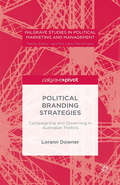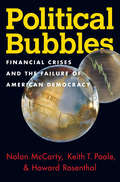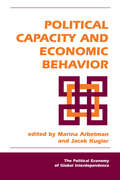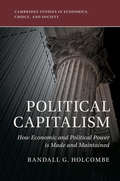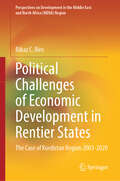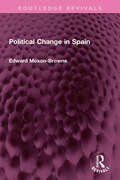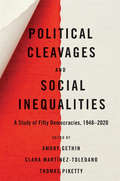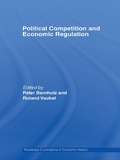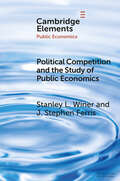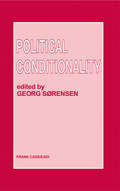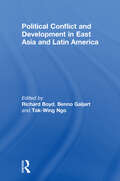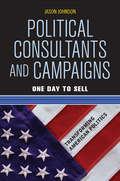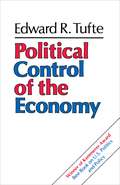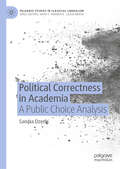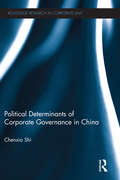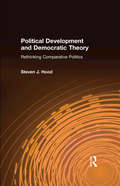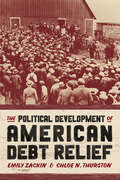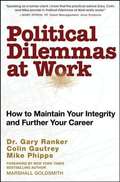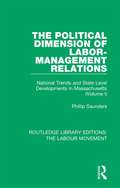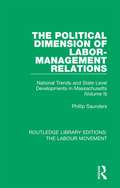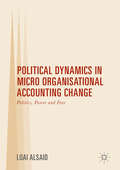- Table View
- List View
Political Branding Strategies: Campaigning and Governing in Australian Politics (Palgrave Studies In Political Marketing And Management)
by Lorann DownerPolitical Branding Strategies.
Political Branding Strategies: Campaigning and Governing in Australian Politics (Palgrave Studies in Political Marketing and Management)
by Lorann DownerPolitical Branding Strategies tells the story of branding by the Australian Labor Party across seven years and three brands – Kevin07, The Real Julia and that of the party. Employing a new framework to understand and evaluate branding, the book offers lessons for practitioners, researchers and citizens in democracies everywhere.
Political Bubbles: Financial Crises and the Failure of American Democracy
by Nolan McCarty Keith T. Poole Howard RosenthalHow governmental failure led to the 2008 financial crisis—and what needs to be done to avoid another similar event Behind every financial crisis lurks a "political bubble"—policy biases that foster market behaviors leading to financial instability. Rather than tilting against risky behavior, political bubbles—arising from a potent combination of beliefs, institutions, and interests—aid, abet, and amplify risk. Demonstrating how political bubbles helped create the real estate-generated financial bubble and the 2008 financial crisis, this book argues that similar government oversights in the aftermath of the crisis undermined Washington's response to the "popped" financial bubble, and shows how such patterns have occurred repeatedly throughout US history.The authors show that just as financial bubbles are an unfortunate mix of mistaken beliefs, market imperfections, and greed, political bubbles are the product of rigid ideologies, unresponsive and ineffective government institutions, and special interests. Financial market innovations—including adjustable-rate mortgages, mortgage-backed securities, and credit default swaps—become subject to legislated leniency and regulatory failure, increasing hazardous practices. The authors shed important light on the politics that blinds regulators to the economic weaknesses that create the conditions for economic bubbles and recommend simple, focused rules that should help avoid such crises in the future.The first full accounting of how politics produces financial ruptures, Political Bubbles offers timely lessons that all sectors would do well to heed.
Political Business in East Asia (Politics in Asia)
by Edmund GomezThe relationship between government and business has become a central issue in East Asia since the financial crisis of 1997. As the Asian economies try to advance the reform process, recent scandals involving corruption and cronyism have demonstrated the ongoing significance of the issue. This edited book features a range of distinguished international specialists and explores the interaction between politics and business across the region. Detailed case-studies focus on Japan, China, South Korea, Malaysia, Thailand, Singapore and Indonesia. This is the first comprehensive introduction to government-business relations in the region and makes a significant contribution to our understanding of the problems faced by the Asian economies.
Political Capacity and Economic Behavior (The Political Economy of Global Interdependence)
by Jacek Kugler<p>Given today's heightened competition between national economies in the global marketplace, many have come to believe that government intervention is needed in order for a country to maximize its economic well-being. But to what extent can even the most capable government act to attract investment and enhance economic growth without creating or exacerbating conflicts in society—especially when unpopular measures, such as those aimed at controlling inflation and population growth, must be implemented? <p>This timely book by an international team of economists and political scientists tackles that question head on. The contributors draw on theory and empirical data to provide a framework for measuring governments' ability to gather material resources and mobilize populations. They analyze a variety of policy choices made in the United States and in other nations around the world during the past fifty years, showing how states can increase their political capacity and thereby reduce economic transaction costs and domestic resistance to government goals.
Political Capitalism: How Political Influence Is Made and Maintained (Cambridge Studies in Economics, Choice, and Society)
by Randall G. HolcombeProblems associated with cronyism, corporatism, and policies that favor the elite over the masses have received increasing attention in recent years. Political Capitalism explains that what people often view as the result of corruption and unethical behavior are symptoms of a distinct system of political economy. The symptoms of political capitalism are often viewed as the result of government intervention in a market economy, or as attributes of a capitalist economy itself. Randall G. Holcombe combines well-established theories in economics and the social sciences to show that political capitalism is not a mixed economy, or government intervention in a market economy, or some intermediate step between capitalism and socialism. After developing the economic theory of political capitalism, Holcombe goes on to explain how changes in political ideology have facilitated the growth of political capitalism, and what can be done to redirect public policy back toward the public interest.
Political Challenges of Economic Development in Rentier States: The Case of Kurdistan Region 2003-2020 (Perspectives on Development in the Middle East and North Africa (MENA) Region)
by Ribaz C. BiroThis book investigates the relationship between politics and economics in rentier states, with a particular focus on the Kurdistan Region of Iraq from 2003 to 2020. Resource-rich states face low levels of economic growth due to the various factors of corruption, weak performance of institutions, poor levels of accountability and transparency in governance, and absence of rule of law. While most previous studies of the topic focus on either the political or economic concerns, this book focuses on their interaction. The book explores the political hurdles in resource-rich states, examining to what extent this impedes economic growth through panel data from 51 rentier states from 2003 to 2020 with different political systems and different types of natural resource dependency. The insights presented in this book have wider implications for understanding and solving similar hurdles in the Kurdistan Region of Iraq and would be a valuable resource for policymakers, strategists, academics, lawmakers, and government officials in implementing sustainable development plans and reducing the negative impacts of natural resource over-reliance in rentier states.
Political Change in Spain (Routledge Revivals)
by Edward Moxon-BrowneFirst published in 1989, Political Change in Spain provides a stimulating and innovative account of Spain’s maturing democracy since 1982. Challenging the accepted wisdom that Spanish democracy is a fragile plant, the author demonstrates its strong roots and healthy growth in the context of the European Community. He argues that, despite the problems of economic transformation, Spain’s political attachments to Western Europe suggest that the Spanish economy will benefit in the long run from its increasing integration with its neighbours. The book also analyses the continuing threat to stability posed by separatist aspirations in the Basque country, in the context of the experiments with autonomous regional governments. This book will be valuable to anyone looking for a succinct introduction to changes in Spain, as well as to students of Western European politics, women’s studies and the Spanish language.
Political Cleavages and Social Inequalities: A Study of Fifty Democracies, 1948–2020
by Thomas Piketty Amory Gethin Clara Martínez-ToledanoThe empirical starting point for anyone who wants to understand political cleavages in the democratic world, based on a unique dataset covering fifty countries since World War II.Who votes for whom and why? Why has growing inequality in many parts of the world not led to renewed class-based conflicts, seeming instead to have come with the emergence of new divides over identity and integration? News analysts, scholars, and citizens interested in exploring those questions inevitably lack relevant data, in particular the kinds of data that establish historical and international context. Political Cleavages and Social Inequalities provides the missing empirical background, collecting and examining a treasure trove of information on the dynamics of polarization in modern democracies.The chapters draw on a unique set of surveys conducted between 1948 and 2020 in fifty countries on five continents, analyzing the links between voters’ political preferences and socioeconomic characteristics, such as income, education, wealth, occupation, religion, ethnicity, age, and gender. This analysis sheds new light on how political movements succeed in coalescing multiple interests and identities in contemporary democracies. It also helps us understand the conditions under which conflicts over inequality become politically salient, as well as the similarities and constraints of voters supporting ethnonationalist politicians like Narendra Modi, Jair Bolsonaro, Marine Le Pen, and Donald Trump.Bringing together cutting-edge data and historical analysis, editors Amory Gethin, Clara Martínez-Toledano, and Thomas Piketty offer a vital resource for understanding the voting patterns of the present and the likely sources of future political conflict.
Political Competition and Economic Regulation (Routledge Explorations In Economic History Ser. #Vol. 36)
by Peter Bernholz Roland VaubelOrganized, readable, technically sound and comprehensive from both theoretical and empirical standpoints, this book summarizes a vast amount of institutional, historical and descriptive detail.Using case studies from the US, Canada, Germany and Switzerland as well as the European Union and the global economy, this is the first book of its kind to e
Political Competition and the Study of Public Economics (Elements in Public Economics)
by Stanley L. Winer J. Stephen FerrisWhy is an understanding of political competition essential for the study of public economics and public policy generally? How can political competition be described and understood, and how does it differ from its strictly economic counterpart? What are the implications of the fact that policy proposals in a democracy must always pass a political test? What are the strengths and weaknesses of electoral competition as a mechanism for the allocation of economic resources? Why are tax structures in democratic polities so complicated, and what implications follow from this for normative views about good policy choice? How can we measure the intensity of political competition, why and how does it vary in mature democracies, and what are the consequences? This Element considers the approach to answer these questions, while also illustrating some of the interesting theoretical and empirical work that has been done on them.
Political Conditionality
by Sørensen GeorgPolitical conditionality involves the linking of development aid to certain standards of observance of human rights and (liberal) democracy in recipient countries. Although this may seem to be an innocent policy, it has the potential to bring about a dramatic change in the basic principles of the international system: putting human rights first means putting respect for individuals and rights before respect for the sovereignty of states.
Political Conflict and Development in East Asia and Latin America
by Richard Boyd Tak-Wing Ngo Galjart BennoLong run processes of socio-economic change generate prodigious problems of social conflict and social control, and governments responsible for these processes must therefore manage the resultant conflict. Consequently, the success or failure of a government's management of such conflicts is a crucial factor in development outcomes. This volume investigates the political struggle for development specifically in two vital regions - East Asia and Latin America. This analysis calls into question the dominant emphasis on institutional and cultural bases for stable growth. A careful historical account of the two regions is presented, which permits the rigorous testing of conventional wisdoms regarding development. Of importance to a broad range of academics in the spheres of development studies, politics, political economy and sociology, this book will also make an interesting read for those with a general interest in these areas.
The Political Construction of Business Interests
by Cathie Jo Martin Duane SwankMany societies use labor market coordination to maximize economic growth and equality, yet employers' willing cooperation with government and labor is something of a mystery. The Political Construction of Business Interests recounts employers' struggles to define their collective social identities at turning points in capitalist development. Employers are most likely to support social investments in countries with strong peak business associations, that help members form collective preferences and realize policy goals in labor market negotiations. Politicians, with incentives shaped by governmental structures, took the initiative in association-building and those that created the strongest associations were motivated to evade labor radicalism and to preempt parliamentary democratization. Sweeping in its historical and cross-national reach, the book builds on original archival data, interviews and cross-national quantitative analyses. The research has important implications for the construction of business as a social class and powerful ramifications for equality, welfare state restructuring and social solidarity.
Political Consultants and Campaigns
by Jason JohnsonPolitical Consultants and Campaigns: One Day to Sell examines the differences between how political science theory suggests campaigns should be run and how political consultants actually run campaigns. In the wake of consultants who effortlessly move from campaigners to policymakers, the dearth of knowledge about the attitudes, beliefs, and strategies of the consultants themselves is still a glaring absence in the analysis of American politics. How can we purport to know what is happening in American political campaigns if we don't know what is on the minds of the men and women who run them? This book provides a clearer understanding of modern-day political campaigns by revealing what is on the minds of the people who run them. With original data from consultants, campaign managers, and professional campaign schools, author Jason Johnson examines consultant behavior on message formation, policy positioning, candidate recruitment, Internet strategy, and negative advertising and compares these practices to existing political science theory. This groundbreaking research makes Political Consultants and Campaigns: One Day to Sell a must-have resource for all students of American politics, campaign managers, or anyone interested in how political campaigns in America are run.
Political Consumerism
by Dietlind Stolle Michele MichelettiShoppers can express their values as they search for value. Political consumerism is turning the market into a site for politics and ethics, as consumer choices reflect personal attitudes and purchases are informed by ethical or political assessment of business and government practice. In such forms as boycotts, when consumers refuse to buy, or buycotts, where consumers shift their purchases, the ostensibly apolitical marketplace is a site of contestation at the intersection of globalization and individualization. This book opens readers' eyes to a new way of viewing everyday consumer choices and the role of the market in our lives, illuminating the broader theoretical and historical context of concerns about sweatshops, responsible coffee, and ethical and free trade.
Political Control of the Economy
by Edward R. TufteSpeculations about the effects of politics on economic life have a long and vital tradition, but few efforts have been made to determine the precise relationship between them. Edward Tufte, a political scientist who covered the 1976 Presidential election for Newsweek, seeks to do just that. His sharp analyses and astute observations lead to an eye-opening view of the impact of political life on the national economy of America and other capitalist democracies.The analysis demonstrates how politicians, political parties, and voters decide who gets what, when, and how in the economic arena. A nation's politics, it is argued, shape the most important aspects of economic life--inflation, unemployment, income redistribution, the growth of government, and the extent of central economic control. Both statistical data and case studies (based on interviews and Presidential documents) are brought to bear on four topics. They are: 1) the political manipulation of the economy in election years, 2) the new international electoral-economic cycle, 3) the decisive role of political leaders and parties in shaping macroeconomic outcomes, and 4) the response of the electorate to changing economic conditions. Finally, the book clarifies a central question in political economy: How can national economic policy be conducted in both a democratic and a competent fashion?
Political Correctness in Academia: A Public Choice Analysis (Palgrave Studies in Classical Liberalism)
by Sandra DzenisThis book explores the phenomenon of political correctness in academia and explains why and how scholars and administrators impact PC&’s prominence in the academic sphere. To do so, it examines the actions of these agents through the lens of public choice theory, revealing how self-interested strategies drive the policies and norms of the university. The book examines the ideological dimensions of political correctness and highlights four key spheres of influence – academic research, higher education curricula, affirmative action and speech codes. The book offers a nuanced exploration of how PC and liberalism have common ground. It demonstrates how the liberal values of equality and individual liberty largely underpin PC, whose regulatory function is to protect a liberal value system from illiberal truth claims. Yet the book also shows how interest groups form around the concept of PC in universities and have successfully used systems of rent-seeking and collective action to shape institutional policy and protect their members from ideological and professional competition, which can be seen as a violation of classical liberal principles of fair competition and equal opportunity. This book is a valuable tool for researchers working in political economy and PPE (politics, philosophy and economics), as well as those interested in the political economy of academia and the concept of PC more generally.
The Political Determinants of Corporate Governance in China (Routledge Research in Corporate Law)
by Chenxia ShiThis book investigates the key factors shaping corporate governance in China and presents a sophisticated study of corporate governance in China from a comparative and historical perspective. Drawing on extensive corporate governance literature, this book articulates why path dependence theory is the most effective framework for interpreting the development path of Chinese corporate governance. Chenxia Shi reviews the historical role of government in commercial development and regulation in dynastic China and in early corporate law-making, followed by an account of China’s legal and economic development over the last three decades. This historical inquiry identifies government control as the key feature of economic and market regulation in China. In particular, this book canvasses the evolution of governance of State-Owned Enterprises and listed companies, major corporate governance problems, regulatory challenges posed by China’s increasing participation in economic globalization, and enforcement difficulties particularly in relation to investor protection, directors’ duties and accountability. Ultimately, Political Determinants of Corporate Governance in China demonstrates that corporate governance in China is largely determined by political imperatives and those political imperatives have been shaped and re-shaped in a historical process.
Political Development and Democratic Theory: Rethinking Comparative Politics
by Steven J. HoodMost comparativists have assumed that democratization is best understood by looking at regimes in the transition and consolidation phases of democracy without really considering the essence of democracy - liberal rights and democratic virtues. Democracy is seen as a mechanistic process without considering the ideas that build democratic regimes. This book begins afresh by proposing that comparativists need to consider democracy to be a combination of rights and virtues, and that the difficulties of democratic transitions, consolidation, and maintenance are essentially problems relating to balancing rights and virtues in the regime. How do we reemphasize these aspects of democracy at a time when comparative literature focuses almost solely on democratic procedure? By combining the best elements of comparative theory and liberal democratic philosophy, Hood argues that comparativists can sharpen the scholarly tools we need to understand both the problems of democratization and maintaining democracy. He provides the reader with a valuable overview of comparative theory and how our abandonment of political philosophy has led to our acceptance of social science methods that can only lead to superficial analyses of democratizing regimes and established democracies.
The Political Development of American Debt Relief
by Emily Zackin Chloe N. ThurstonA political history of the rise and fall of American debt relief. Americans have a long history with debt. They also have a long history of mobilizing for debt relief. Throughout the nineteenth century, indebted citizens demanded government protection from their financial burdens, challenging readings of the Constitution that exalted property rights at the expense of the vulnerable. Their appeals shaped the country’s periodic experiments with state debt relief and federal bankruptcy law, constituting a pre-industrial safety net. Yet, the twentieth century saw the erosion of debtor politics and the eventual retrenchment of bankruptcy protections. The Political Development of American Debt Relief traces how geographic, sectoral, and racial politics shaped debtor activism over time, enhancing our understanding of state-building, constitutionalism, and social policy.
Political Dilemmas at Work
by Colin Gautrey Mike Phipps Gary RankerMike Phipps and Colin Gautrey's first book, 21 Dirty Tricks at Work, presented the most common political tactics used by individuals in the workplace. This book helped many people around the world handle these tactics in a constructive and assertive manner. What was not tackled were the more strategic political situations that people find themselves in when others exert their power and influence, the type of political campaigns that can leave individuals feeling bemused, fearful and paralyzed. Political Dilemmas at Work will present real political challenges in an original and engaging way - which will be instantly recognizable by any experienced manager. Then, based on the authors' experience of coaching managers and directors, they will offer analysis and practical tools and tips about how to deal effectively in these situations. With the workplace becoming more political and competitive by the day, Political Dilemmas at Work will come to the rescue. This book will become required reading for anyone who is ambitious and wants to ensure that they do not fall foul of negative organizational politics.
The Political Dimension of Labor-Management Relations: National Trends and State Level Developments in Massachusetts (Volume 1) (Routledge Library Editions: The Labour Movement #27)
by Phillip SaundersFirst published in 1986. This study examines both labor’s and management’s political activities in the state of Massachusetts. The book, while historical in character, provides an interpretation of change, and identifies, describes and interprets temporal sequences. The primary aim of this study is to trace the evolution of public policy in the United States in the broad area of labor-management relations. The attempts of organized labor and management groups to influence public policy through the political process are examined, with a more detailed examination of labor and management political struggles in Massachusetts. This title will be of interest to students of political and labor history.
The Political Dimension of Labor-Management Relations: National Trends and State Level Developments in Massachusetts (Volume 2) (Routledge Library Editions: The Labour Movement #28)
by Phillip SaundersFirst published in 1986. This study examines both labor’s and management’s political activities in the state of Massachusetts. The book, while historical in character, provides an interpretation of change, and identifies, describes and interprets temporal sequences. The primary aim of this study is to trace the evolution of public policy in the United States in the broad area of labor-management relations. The attempts of organized labor and management groups to influence public policy through the political process are examined, with a more detailed examination of labor and management political struggles in Massachusetts. This title will be of interest to students of political and labor history.
Political Dynamics in Micro Organisational Accounting Change
by Loai AlsaidThis book explores the role of politics in cost accounting change. Empirical research sheds new light on how the macro-political dynamics of the state can underpin micro-level changes in an organisation's cost management practices. Taking an Egyptian state-owned enterprise as its case study, chapters explore the political evolution of these practices and how they became a political and consequently strategic imperative. The author examines the roles played by neoliberal political reform, re-privatisation, modernisation and state budget reform in relation to micro level changes in cost management practices. Readers are invited to learn about the public sector cost management practices and the changes that have taken place in various political, cultural, economic, and organisational settings.

